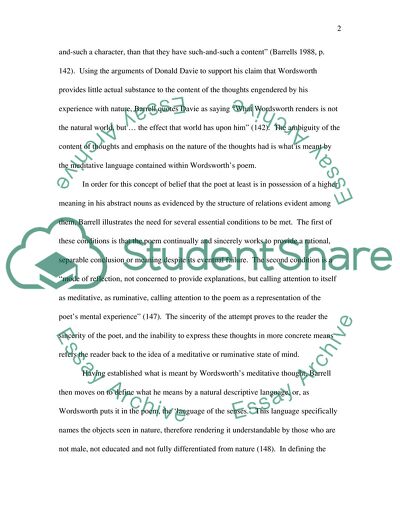
- Home
- Free Samples
- Premium Essays
- Editing Services
- Extra Tools
- Essay Writing Help
- About Us
- Studentshare
- Subjects
- Miscellaneous
- Argument analyis on Tintern Abbey Critisism
Argument analyis on Tintern Abbey Critisism - Essay Example

- Subject: Miscellaneous
- Type: Essay
- Level: Masters
- Pages: 4 (1000 words)
- Downloads: 0
- Author: bertrand18
Extract of sample "Argument analyis on Tintern Abbey Critisism"
As might be assumed, Barrell’s argument chiefly explores the differences between meditative language and natural descriptive language used in the poem as it is illustrated through the use of Dorothy. To support this argument, Barrell first works to define what he means by meditative language. To do this, he takes a look at the specific words used in the poem to represent higher thought, specifically the use of the word ‘thought’ and the context in which it appears. “… though we get some idea, of course, of their content, the poem seems far more concerned to impress upon us the notion that these thought have such-and-such a character, than that they have such-and-such a content” (Barrells 1988, p. 142). Using the arguments of Donald Davie to support his claim that Wordsworth provides little actual substance to the content of the thoughts engendered by his experience with nature, Barrell quotes Davie as saying “What Wordsworth renders is not the natural world, but … the effect that world has upon him” (142).
The ambiguity of the content of thoughts and emphasis on the nature of the thoughts had is what is meant by the meditative language contained within Wordsworth’s poem. In order for this concept of belief that the poet at least is in possession of a higher meaning in his abstract nouns as evidenced by the structure of relations evident among them, Barrell illustrates the need for several essential conditions to be met. The first of these conditions is that the poem continually and sincerely works to provide a rational, separable conclusion or meaning despite its eventual failure.
The second condition is a “mode of reflection, not concerned to provide explanations, but calling attention to itself as meditative, as ruminative, calling attention to the poem as a representation of the poet’s mental experience” (147). The sincerity of the attempt proves to the reader the sincerity
...Download file to see next pages Read More
- TERMS & CONDITIONS
- PRIVACY POLICY
- COOKIES POLICY